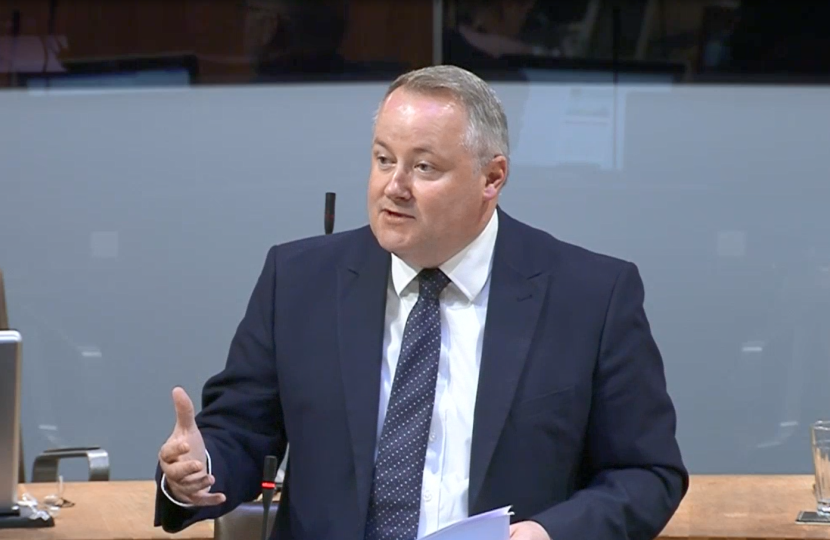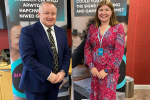
In a moving debate in the Senedd yesterday, Clwyd West MS Darren Millar played tribute to the victims of the Holodomor genocide.and said “the people of Wales will continue to do all that they can to champion the Ukrainian people”..
In the debate, Darren, and other MSs, put forward a motion proposing that the Senedd:
1. Remembers the victims of the Holodomor genocide and the historical connection to Wales through Gareth Jones’s reporting.
2. Recognises the contributions and dedication of the Senedd 4 Ukraine group.
3. Commits to ongoing solidarity with Ukrainians in Wales and with Ukraine
Speaking in the debate, Darren commemorated the millions who died during the 1932-33 famine in Ukraine and said more must be done to educate people about the Holodomor.
He said:
“Can I thank the Government, and, indeed, the other political parties, for the way in which they worked together to co-operate in co-tabling this debate some 12 months after the recognition by this Senedd, one of the first Parliaments in the world to recognise the Holodomor as a genocide?
“Of course, the Holodomor is a chapter of history that was for far too long in the west not known, and it was a story that was not told. Some 3 million to 4 million victims, at least, were casualties of that famine, one of the worst losses of life in human history, and, of course, understandably, because of that, it is a defining moment for the nation of Ukraine.
“But they were not accidental losses of life, they were absolutely deliberate. They were deliberately inflicted upon the people of Ukraine by a Soviet regime run by Stalin that ruthlessly pursued a goal of industrialisation no matter what the human cost, and that drove the collectivisation of farmland and the mass seizure of grain. The result of that was this very fertile and extremely productive land, in what is now known as the bread basket of Europe, was subjected to one of the worst famines in history.
“Of course, it wasn't just the famine that was evidence of the genocidal attempts of the Soviet regime; there was the persecution of the intellectuals, the faith leaders, attacks on churches and others in that land as well, and any political opponents that spoke out against the Soviet regime.”
Darren went on to refer to the role of Gareth Jones, a Welshman who, in the 1930s, played a crucial role in exposing the Holodomor and what was going on in Ukraine to the rest of the world.
He said:
“I first became aware of his work after watching the 2019 film Mr Jones. I had no idea that it was a Welshman that was involved in exposing what had happened until I saw that film, and that's a tragedy. That's a tragedy that people in Wales aren't taught about these things, aren't educated about the important role that Welsh journalists have played. Of course, he paid with his own life in the end, when he was a victim of what is regarded as probably an assassination in Japanese-occupied Inner Mongolia in 1935, by the Soviet regime. And all of us, no doubt, in this Chamber will want to pay tribute to his memory here in this Chamber today.
“I know that the Senedd 4 Ukraine group, so ably led by Mick Antoniw has already secured the permission for a plaque to be erected in Ukraine to mark the role of Gareth Jones and his work in exposing what was going on with the Holodomor.”
Darren added:
“We must do all that we can to send the message that Wales loves Ukraine, that we support its quest for freedom, that the people of Wales will continue to do all that they can to champion the Ukrainian people, that we will continue to host those who need safe refuge in our nation, and that we will support those charities and organisations that continue to work to make sure that we're the best hosts that we can possibly be.”
